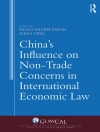Realizing Roma Rights investigates anti-Roma racism and documents a growing Roma-led political movement engaged in building a more inclusive and just Europe. The book brings to the forefront voices of leading and emerging Romani scholars, from established human rights experts to policy and advocacy leaders with deep experience.
Realizing Roma Rights offers detailed accounts of anti-Roma racism, political and diplomatic narratives chronicling the development of European and American policy, and critical examination of Roma-related discourse and policies in contemporary Europe. It also investigates the complex role of the European Union as a driver of progressive change and a flawed implementer of fundamental rights.
This book will provide a useful source for those interested in the dynamics of contemporary stigma and discrimination, the enduring challenges of mobilizing within severely disempowered communities, and the complexities of regional and transnational human rights mechanisms. Spanning as it does a broad disciplinary range that encompasses law, history, sociology, political theory, critical race theory, human rights, organization theory, and education, Realizing Roma Rights is a useful teaching tool for interdisciplinary courses on human rights, racism and xenophobia, political theory, European studies, and minority issues.
Contributors: Jacqueline Bhabha, James A. Goldston, Will Guy, Fernando Macías, David Mark, Teresa Sordé-Martí, Margareta Matache, David Meyer, Andrzej Mirga, Kálmán Mizsei, Krista Oehlke, Alexandra Oprea, Elena Rozzi, Erika Schlager, Michael Uyehara, Peter Vermeersch.
Table of Content
Realizing Roma Rights: An Introduction
PART I. THE LONG SHADOW OF ANTI- ROMA DISCRIMINATION
Chapter 1. Roma Children and Enduring Educational Exclusion in Italy
—Elena Rozzi
Chapter 2. Toward the Recognition of Critical Race Th eory in Human Rights Law: Roma Women’s Reproductive Rights
—Alexandra Oprea
PART II. THE LONGUE DURÉE: THE HISTORY OF ROMA POLICY AS AN ELEMENT IN U.S. FOREIGN POLICY
Chapter 3. Policy and Practice: A Case Study of U.S. Foreign Policy Regarding the Situation of Roma in Europe
—Erika Schlager
Chapter 4. The U.S. Department of State and International Efforts to Promote the Human Rights of Roma
—David Meyer and Michael Uyehara
PART III. TAKING STOCK OF EUROPEAN PUBLIC POLICY: THE IMPACT OF ROMA INCLUSION STRATEGIES
Chapter 5. A Critical Analysis of Roma Policy and Praxis: The Romanian Case
—Margareta Matache and Krista Oehlke
Chapter 6. Roma Policy in Europe: Results and Challenges
—Andrzej Mirga
Chapter 7. Reconstructing Roma Integration in Central and Eastern Europe: Addressing the Failures of the Last Quarter Century
—Kálmán Mizsei
PART IV. THE ENDURING CHALLENGE OF TACKLING ANTI- ROMA INSTITUTIONAL DISCRIMINATION AND POPULAR RACISM IN CONTEMPORARY EUROPE: A COMPARATIVE ANALYSIS
Chapter 8. Anti- Roma Violence, Hate Speech, and Discrimination in the New Europe: Czech Republic, Slovakia, and Hungary
—Will Guy
Chapter 9. The Unfulfi lled Promise of Educational Opportunity in the United States and Europe: From Brown v. Board to D.H. and Beyond
—James A. Goldston
PART V. LOOKING FORWARD: THE IMPERATIVE OF ROMA COMMUNITY MOBILIZATION AND LEADERSHIP
Chapter 10. Making Roma Rights a Reality at the Local Level: A Spanish Case Study
—Teresa Sordé Martí and Fernando Macías
Chapter 11. Roma Mobilization and Participation: Obstacles and Opportunities
—Peter Vermeersch
Chapter 12. Roma in European Politics, Looking to the Future
—David Mark
Notes
List of Contributors
Index
Acknowledgments
About the author
Jacqueline Bhabha is Professor of the Practice of Health and Human Rights at the Harvard School of Public Health, the Jeremiah Smith Jr. Lecturer in Law at Harvard Law School, and Adjunct Lecturer in Public Policy at the Harvard Kennedy School. She is Director of Research at the Harvard FXB Center for Health and Human Rights. Andrzej Mirga is Polish Roma, an ethnologist, analyst, and activist. He chairs the board of the Roma Education Fund (Budapest). Margareta Matache is a Romani scholar and activist from Romania. She is an instructor at the Harvard FXB Center for Health and Human Rights and Director of the Roma Program at Harvard.












